Tommy Cooper: Always Leave Them Laughing (34 page)
Read Tommy Cooper: Always Leave Them Laughing Online
Authors: John Fisher

The historical segment is now remembered as a highlight of the enterprise, providing some of the defining moments of Cooper’s television career and adding weight to Barry Cryer’s premise of how you wrote for the man: ‘The perfect Tommy Cooper sketch is one that says, “Tommy enters tailor’s shop – does trousers jokes – then exits.”’ The roll call of history was summoned to provide excuses for jokes, jokes, and more jokes. Old jokes were brought back into service, as in the Dr Livingstone episode where he brought forth ‘the skull of a very famous witch doctor – and here’s the skull of the same witch doctor when he was a boy!’ Some were excruciatingly awful, like the time he dragged up as Florence Nightingale –‘Call me “Sir”’? ‘Why?’‘I’m a night nurse!’ Others were visually inventive, like the three cornered Dick Turpin hat that spun around on his head. Cooper fell in love with the device like a child with a new toy. Other comics would have left well alone after the first revolve, but Cooper in his usual way must have repeated the business at least seven times getting bigger laughs all the while. As Cryer says, ‘He had that flair. You’d say he was overdoing it, but then you heard the laughter he got.’ Tommy was fully aware he was breaking the so-called rules: ‘I just slipped that one in there. I wasn’t gonna do that. I wasn’t.’ But there was more to the gag than the mechanics of the prop. Cooper’s increasingly giddy look of disorientation as it spun around made it far more than a fancy dress shop accessory.
Throughout these segments he displayed a newfound relish
in the absurdity of what he was about, as in the Toulouse-Lautrec sketch when down on his knees, which had shoes attached –‘Mini Cooper!’– he launched into what at the time must have been an extremely painful dance version of ‘Happy feet, I’ve got those happy feet’ and then discovered a way of levering himself up on the arms between two chairs to convey the illusion that he really had lost eighteen inches. When he portrayed Henry VIII he had the same fun heaving up his upholstered stomach onto his chest every time he leaned back in the chair. When the Julius Caesar sketch flagged he launched into a song on the zither: ‘Oh, how we danced on the night that we wed. We danced and we danced cos the room had no bed.’ Over the laughter Tommy shouts, ‘Listen to that, see,’ as if to remonstrate to Miff that he was the one who knew what made people laugh, before incongruously invoking the name of his hero, ‘Miller’s the name, lady. Here’s another one!’ Funniest of all was the infamous Robin Hood sequence when he shunned Lincoln green for Lincoln pink. It is hard to imagine that he reached the end of rehearsals before realizing that a costume was being prepared for him in a colour that superstition forbade him to wear. Dick Vosburgh remembers it was the day of the show. He had never seen Cooper more agitated: ‘I’m
not
wearing it!’ The wardrobe department rose to the emergency and, long before Mel Brooks deconstructed the Sherwood myth in
Robin Hood
:
Men in Tights
, quickly made him another in the new colour. Again a funny hat came to the fore, this time with extended peak and long, adjustable feather used to impersonate a railway signal to the sound of an express train –‘The Golden Arrow!’ Reeves provided a natural audience – one could almost have believed that he had not seen a script – but like a fine straight man had the improvisatory skills to rein in Cooper as he wandered off on yet another flight of playful fancy.
One major feature that distinguished the LWT shows from those at Thames was the high level of guest stars attracted to work with Cooper in the other sketches. In moving across from ATV to the BBC in 1968, Morecambe and Wise had raised the stakes in this regard. LWT was anxious for Cooper to be seen to give them more than a run for their money. The resident repertory company of British sit com stalwarts that had adorned Tommy’s previous series, including Deryck Guyler, Robert Dorning, Dudley Foster, Arthur Mullard, Bob Todd, and Dandy Nichols, was now supplanted by a more glittering array of guest performers that embraced Ted Ray, Arthur Lowe, Bernard Cribbins, Richard Briers, Thora Hird, Vincent Price, Eric Sykes, and the Ronnies, Barker and Corbett, though not together. However there was a fundamental difference in the dynamic between star/stars and guest. On
The Morecambe and Wise Show
visiting artists queued up for a chance to be ridiculed by the comedy duo and, before the show was over, to upstage them: one has to think only of Leonard Rossiter, Angela Rippon, Peter Cushing, and Glenda Jackson. However, as Eric Morecambe was the first to admit, nobody upstaged Cooper.
According to Dick Vosburgh, Price was already a fan ahead of the occasion, his fascination for the
Planet Cooper
prompting the query, ‘Where is it in this galaxy?’ He was so carried along by the spirit of the show that he even perpetrated a card trick on the star that misfired by one digit –‘Well, what’s a spot among friends?’– at which point the missing spade mysteriously slid into position. He also took part in a Mississippi river boat melodrama in which Price played the gentleman gambler anxious to marry off his ugly daughter to Tommy’s banjo-strumming hayseed character. When Cooper accuses Price of cheating, it ends in a duel with the two combatants measuring out their paces. Tommy fires.
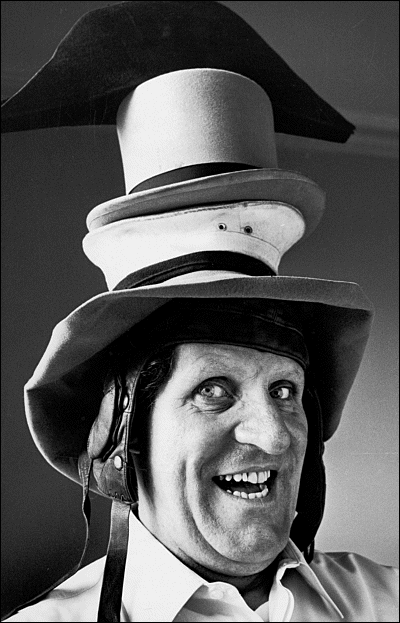
A modern Mad Hatter.
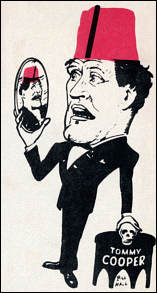
The caricature by Bill Hall.
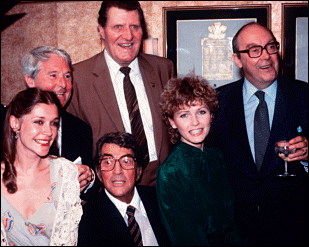
‘Where’s Jerry Lewis when I need him?’: Dean Martin at the Variety Club Lunch held in his honour, with Tommy and Morecambe and Wise.
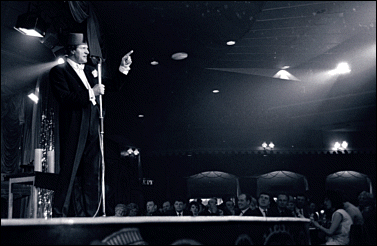
Master of his terrain: playing the clubs in the Seventies.
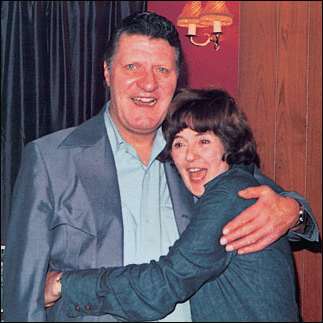
With Mary Kay during the latter years.
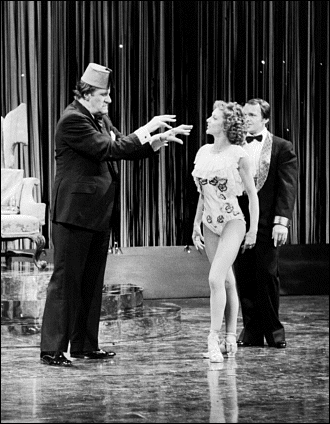
‘Look into my eyes’: the New London Theatre television series, 1978.
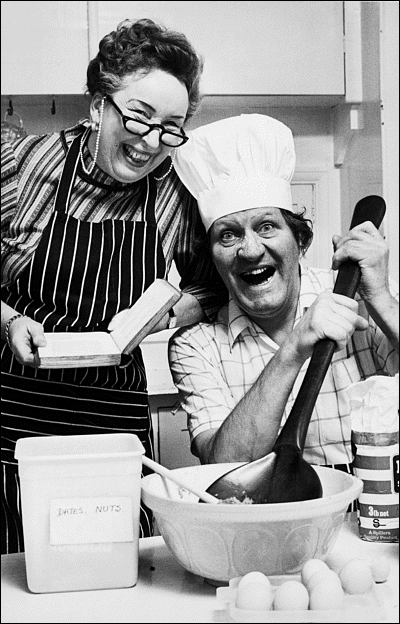
A modern Punch and Judy: ‘That’s the way to do it!’
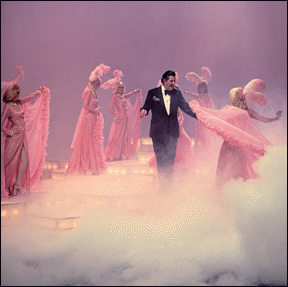
‘On a clear day …’
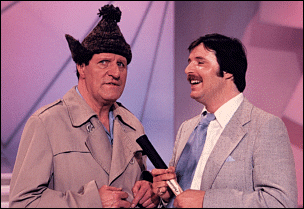
‘Look at the buffalo and speak into the tennis racquet’: with his son, Thomas Henty.
